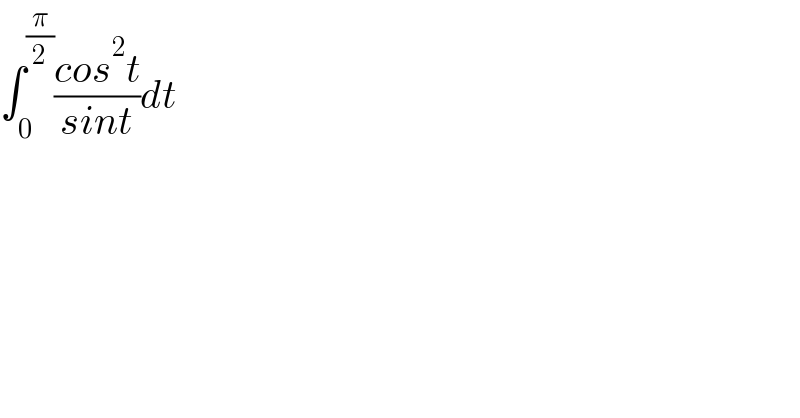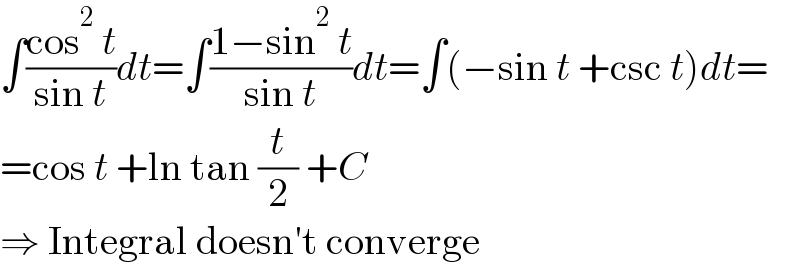Question Number 142643 by ArielVyny last updated on 03/Jun/21

$$\int_{\mathrm{0}} ^{\frac{\pi}{\mathrm{2}}} \frac{{cos}^{\mathrm{2}} {t}}{{sint}}{dt} \\ $$
Answered by MJS_new last updated on 03/Jun/21

$$\int\frac{\mathrm{cos}^{\mathrm{2}} \:{t}}{\mathrm{sin}\:{t}}{dt}=\int\frac{\mathrm{1}−\mathrm{sin}^{\mathrm{2}} \:{t}}{\mathrm{sin}\:{t}}{dt}=\int\left(−\mathrm{sin}\:{t}\:+\mathrm{csc}\:{t}\right){dt}= \\ $$$$=\mathrm{cos}\:{t}\:+\mathrm{ln}\:\mathrm{tan}\:\frac{{t}}{\mathrm{2}}\:+{C} \\ $$$$\Rightarrow\:\mathrm{Integral}\:\mathrm{doesn}'\mathrm{t}\:\mathrm{converge} \\ $$
Commented by ArielVyny last updated on 03/Jun/21
![in [0.(π/2)] integral does not converge ?](https://www.tinkutara.com/question/Q142650.png)
$${in}\:\left[\mathrm{0}.\frac{\pi}{\mathrm{2}}\right]\:{integral}\:{does}\:{not}\:{converge}\:? \\ $$
Commented by MJS_new last updated on 03/Jun/21
![yes. [cos x]_0 ^(π/2) =0−1=−1 [ln tan (x/2)]_0 ^(π/2) =0−lim_(x→0^+ ) ln tan (x/2) but this limit doesn′t exist](https://www.tinkutara.com/question/Q142651.png)
$$\mathrm{yes}. \\ $$$$\left[\mathrm{cos}\:{x}\overset{\pi/\mathrm{2}} {\right]}_{\mathrm{0}} =\mathrm{0}−\mathrm{1}=−\mathrm{1} \\ $$$$\left[\mathrm{ln}\:\mathrm{tan}\:\frac{{x}}{\mathrm{2}}\right]_{\mathrm{0}} ^{\pi/\mathrm{2}} =\mathrm{0}−\underset{{x}\rightarrow\mathrm{0}^{+} } {\mathrm{lim}}\:\mathrm{ln}\:\mathrm{tan}\:\frac{{x}}{\mathrm{2}}\:\:\:\:\:\mathrm{but}\:\mathrm{this}\:\mathrm{limit}\:\mathrm{doesn}'\mathrm{t}\:\mathrm{exist} \\ $$
